Doctor Who Season 8 spoilers below.
Things got a bit uncomfortable in Hall H of the San Diego Convention Center at this year’s Comic-Con when Doctor Who showrunner Steven Moffat’s patience for the “When will the Doctor be female?” question finally snapped, leading him to offer the following testy response during the show’s well-attended panel, “”Well, I think my opinion is fairly obvious from the show, isn’t it? What [do] I think about the possibility and whether it would work or not? I think I’ve expressed myself about as clearly as I could, in the context of the show. If you’re not reading the subtext, then I’ll lend you. But believe me, some people aren’t reading that subtext, ’cause it’s too subtle.”
There were murmurs of disapproval from the crowd, resulting in both Michelle Gomez and Peter Capaldi quickly cracking jokes to ease the tension (e.g., Capaldi offered to appear in a drag in a season 9 episode). However, Moffat actually has made himself perfectly clear on the subject. He gave us the first female Doctor (in the charity special Doctor Who: The Curse of the Fatal Death), approved “The Doctor’s Wife” joke which confirmed Time Lords can switch genders via regeneration, and then he made The Master into a female in season 8. However, he will not be pressured into a token hiring just for tokenism reasons. It’s not about finding the right guy for the job; it’s about finding the right performer, and in Moffat’s view the moment he encounters the perfect actress to be the Doctor he’ll know it.
Why did he have to be so ambiguous about it at Comic-Con? Because, as Vanity Fair argued, Moffat is quite often his own worst enemy, and his tendency to toy with fandom via the press has ultimately backfired on him. On matters of gender equality and representation, he’s long since been at odds with Doctor Who fans, even though he is the author of more Bechdel Test-passing scripts than any other in modern Who history.
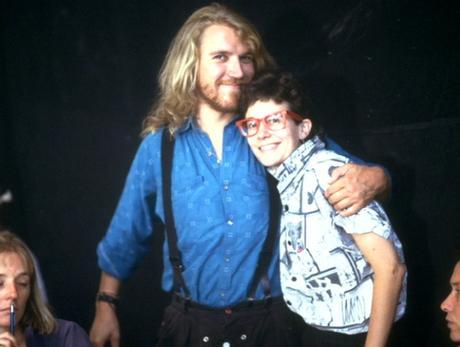
Rachel Talalay on the Nightmare on Elm Street 4 set with director Renny Harlin
And that’s where Rachel Talalay comes in. The former New Line executive-turned director (Freddy’s Dead: The Final Nightmare, Tank Girl) joined Doctor Who’s roster of directors last season, helming the two-part finale “Dark Water”/”Death in Heaven.” She’s been invited back to repeat that feat for the upcoming ninth season. Her hiring kind of a big deal because ever since Moffat took over from Russell T. Davies, female directors and writers have pretty much had no chance to work on Doctor Who (although there have been several female producers). All of a sudden, season 8 hired not just Talalay to work on season 8 but also Sheree Folkson to direct an episode (“In the Forest of the Night”). Now, not only will season 9 end with two episodes director by a woman (Talalay) it will actually open with two episodes directed by a woman (Hettie MacDonald). Plus, Catherine Tregenna and Sarah Dollard each got to write an episode.
However, that’s not stopping the fans from tearing into Moffat, and last December Talalay engaged in a lengthy conversation with one such fan (behind the Tumblr page WhovianFeminism) who had a particularly negative response to Moffat killing off multiple female characters in the episodes Talalay directed. The result is one of the more interesting dialogues between filmmaker and fan I’ve ever seen, and is a fascinating view into what it’s like to be a female cracking into a traditionally male-dominated role in the entertainment industry. It’s an absolute must read, not just for Doctor Who fans but for anyone remotely interested in what it’s like to be a woman working in TV:
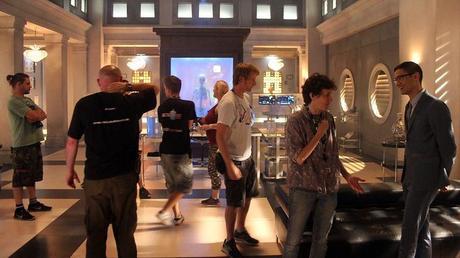
Talalay on the Doctor Who set with cast and crew
Alyssa: How have you perceived the fan reaction so far, both to the announcement that you would be the director of the season finale, and the reactions that have come since the episodes have aired?
Rachel: When I was hired, I really worried there would be a backlash because I’m American, or because I’m a woman, or because of any number of things I’ve done wrong in my career in the eyes of the fandom. But, to my relief, by and large the reactions to both the hiring and the work have been terrific. While there will always be the haters, I feel lucky that I’ve generally been embraced. On the other hand, I try not to read too much criticism or I would go crazy!
But I find it fascinating that “Dark Water” had these incredible responses, but that “Death in Heaven” resulted in this polarized finale debate over all-things-Steven-Moffat. And I have been interested in and confused by — and you and I should get into this — the Moffat haters and the accusation of sexism. People have been asking if I got this job because I’m a woman, if I got this job because Steven Moffat is just turning things around because there has been so much pressure against him. Did he finally hire a woman writer for Series 9 because of the pressure, and does that diminish who we are?
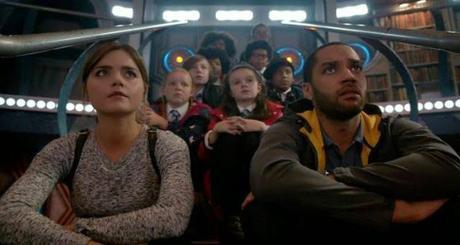
The episode Sheree Folkson directed
Alyssa: That’s one of the questions that I’ve wrestled with a lot. I actually did some research around the time it was announced that you and Sheree Folkson were going to be directors for Series 8, and Directors UK says that of the total directing workforce in the UK, only 30% are women. And that number is even more divided by genre. In terms of the major drama series, there are very few, if any, women directing those. So, personally, I would like to see more women behind the scenes in the production, just as a measure of representation. I also think that they would have a lot of interesting perspectives to contribute. But I also worry about the perception that it’s going to create when these women are hired. People will just assume that they are only being hired because there was so much pressure to hire a woman, not because they were qualified. What was the behind the scenes dynamic with you and the crew about your hiring, the reasons that you were hired, and how you would handle this fan reaction?
Rachel: I’m really surprised the figure is as high as 30%. Those statistics are much better than in the US, where last year only 7% of features were directed by women and, I think, 13% of television episodes. 30% would be a huge victory.
One of the first conversations I had with Steven Moffat, I joked about the topic right away — that if the internet were to be believed, I was only hired because I was a woman. This has already been quoted, but he said “You’re a woman?” And then “We chose you because of your reel and your work.” Of course, one could argue that was the only ‘correct’ answer and you’ll have to ask him and EP Brian Minchin what the real hiring process was.
Sheree Folkson, who was hired after me, mentioned that she was concerned that it would be perceived that she was hired on gender lines because “In the Forest of the Night” was a ‘softer’ episode with children and also it was supposed to be VFX-lite, although it wasn’t. I didn’t have these worries because the finale scripts didn’t hold back — massive, explosive, stunts and effects-laden.
Doctor Who is one of the most ambitious shows in television. I can’t say there was a behind-the-scenes dynamic. My starting place was simply how do I do a job that blows their mind? Don’t screw it up. For me, the whole experience was tremendous. The producers, the crew, the cast — all working together to continue to push the envelope and outdo themselves each week, each season.
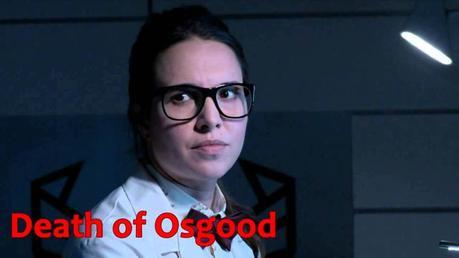
Rachel: At the risk of being flayed, my starting point is that it’s entertainment. I don’t start reading a script as a political analysis. I never even thought about some of the points that you brought up in your blog or that I read other places.
When I read my episodes, nothing stood out for me as problematic. But now I question this, because I’d like to talk about the fridging of Osgood. I thought a lot about this after the fact, and Ingrid and I have discussed it. It didn’t occur to me as I read the script that this was classic fridging. I thought it was an incredibly gutsy move to kill off an absolute fan favorite. I just thought, “I can’t believe he did that!” That was my entire emotional response. And then five minutes later, in theory, he kills off Kate Lethbridge Stewart as well. And this is what I love about the fandom. Is Osgood really dead? Maybe not! Is she a Zygon duplicate? I love that this is where the fandom goes! I think if I had discussed this with Steven — and I shouldn’t speak for him — but he might have explained (as I’ve read in interviews) that this is a manner of showing the degree of Missy’s evil, and maybe my answer would have been “But that’s classic fridging.” Except my thought was that there was already so much back-story to the relationship between the Doctor and the Master, who needs fridging? That’s probably why I didn’t initially see it that way — the Doctor didn’t need motivation to go up against Missy.
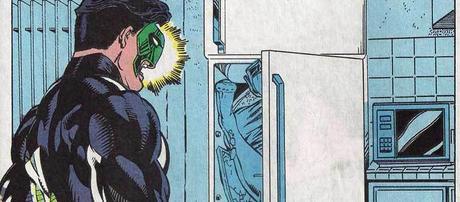
“Fridging” refers to a Green Lantern moment where the hero’s girlfriend was brutally murdered by the bad guy and left in the fridge for him to find.
Alyssa: I think that’s very interesting, because one of the responses I get from people on the internet a lot about how I interpret feminism and sexism in Doctor Who is “Well, there are so many strong women who work with Moffat, and doesn’t that negate all your criticism?” But there isn’t just one feminist interpretation, we all view these things different ways. And sometimes we don’t think about things until we’ve seen it a few times. So the first time I saw Osgood’s death, I thought it was riveting and terrifying. And Missy reminded me a lot of a Classic Master. It wasn’t until I watched it two or three times that I thought to myself “Osgood was just fridged!” It was a classic fridging example!
Rachel: Good! I don’t feel bad then about my initial response! But did I have a responsibility to say something? When I talk to people, an even more sensitive issue is around the Doctor and Clara. I think that Clara is a great companion. And I think that she’s strong and she’s vulnerable. A lot of things work really well with her: Moffat’s playing around with “Is she the Doctor” and “Is she more capable than he is?” and “What is a lie?” and all these big picture questions. But there’s this big issue about the Doctor criticizing her looks. I never thought this. To me that was a character trait of The Doctor – that he got things wrong. It was about him, not Clara. (Some of the humor is so patently ridiculous – him confusing their ages – that I took it only as humour).
And he did it to other characters, not just Clara. But that’s just my interpretation, I respect if people disagree with me, because I know this really upset some fans. But I must say that when I’ve had this debate with people in person, they felt really strongly that I am wrong and they hated those moments, even to the point of not wanting to watch the show.
Which brings me back to questioning if I have a responsibility to question these moments? For me I have to walk a very fine line, because it’s really important to be seen as problem-free as possible as a director (even though I don’t always succeed at that … ), because I do feel judged more critically as a woman than I perceive how my male counterparts are viewed. This always sounds self-serving, how do you prove you are judged or treated differently? See, ‘women whine’.
Sometimes I’m on set and the crew will talk about a male director ‘phoning it in’. And then next thing I know he’s invited back. But I have never heard that about a woman director — if there are any flaws (and we all have flaws), they appear to be magnified. You feel you have to be some version of perfect, because they seem to be finding problems instead of excusing them.
And many executives and crew are happily unaware that they are doing that. Inherent prejudices are invisible to their owners.
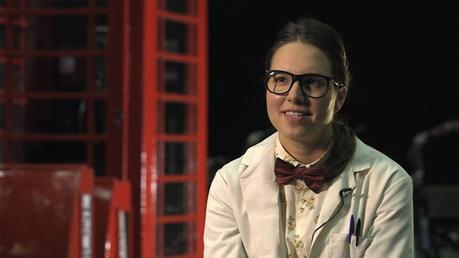
It’s worth noting that Osgood will return in season 9, likely due to some Zygon shenanigans
Alyssa: So trying to get more women into TV sometimes means women don’t get quite the freedom to express what their personal beliefs are about the material that is being shot, because they have that pressure to put on this perfect persona of someone who is not going to cause a problem on set.
Rachel: Yes, because of the perception of being judged so much more harshly. Recently a male director said to me, “Don’t you love it when you just don’t know what you’re going to do with a scene and you come on set and you kind of just say to everybody ‘How do you think we should do this?’” My jaw dropped. I do not believe I have the luxury to do that. It would risk comments like “She doesn’t know what’s she’s doing. She had to ask the crew.”
I was once taken aside and criticized by a Producer: “Why do you change things between takes? You always make it better, but can’t you get it right to start with?” Isn’t that directing? A process of watching and analyzing and attempting to make it better? Always looking for ways to improve things?
But more and more, crew members are admitting to me: “It’s awful to see how differently they treat you, they would never have said that to a male director.” That’s my best indicator that it’s really different. Sometimes it surprises me because I’m unaware that I’m being treated differently and the crew is seeing things that I am used to. Plus I hear it from other women directors I talk to. And the stories they tell are often much worse than anything I’ve ever experienced. I’ve been very lucky.
And most women won’t speak up – for even more fear they won’t work again. What if someone reads this and thinks “I don’t want to work with her – she sounds too strident or opinionated or … whiny”?
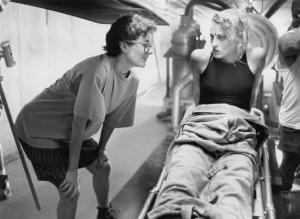
Talalay and Lori Petty on the set of 1995’s Tank Girl
With Tank Girl, I thought I could break the glass ceiling. And instead, the glass ceiling crushed me, absolutely came down and crushed me. I thought I’m going to make this kick ass, totally out-there female action movie. We’re going to show that there’s this great audience for it. And instead it came crashing in on us. It was a hellish experience. And after that, when it didn’t sell enough tickets, people said that female action heroes were never going to work and that was the end of it. I liked it when I was idealistic.
Alyssa: Feminism does seem to be having a moment again. Everybody is coming back to it. And I think we need to find a way to have a conversation that isn’t just “My opinion is right.” Because I think that dynamic also works to feminism’s detriment. White feminists get criticized especially for that attitude. We say that there’s one right way to be a feminist, and a lot of people criticize that. Being open and willing to have that conversation benefits us in the long term.
Rachel: There was an interesting criticism in the comments on a Verity! podcast. Somebody was upset by my hiring and asked if the best they could do was a white woman. It was very nicely responded to with: “One step at a time.” If we criticize that, then we’ll only end up with white men. Everything is a step. That leads us to a bigger question: what can we do to help women get more work in the film business? Because it’s so hard to get the job to start with. It’s so competitive. And then how do you make sure that somebody is really ready to do the job? And do it so well that they transcend gender politics.
People keep saying this is the golden age of television, because now movies are disappearing. So either you have to mortgage your house to make a movie, make it for $5, or you have to be on one of the ten big movies. They barely make any mid-budget movies, which is so sad. But then how do you train to get into television? Now you have these big name feature directors coming in and directing pilots. They’ve already gotten to this point where they’re respected and they’re allowed to be creative.
I think we have to be very visionary in terms of giving women opportunities, because they come in with so much less experience, because they struggle more to get the jobs. It’s a lose-lose. How do you get experience if you can’t get hired? Then you are accused of having less experience, not supported because of it. And I think we all have a responsibility to support women directors and to try to figure out how to get them the training so they don’t get pigeonholed. I think that the more experience we can get for women, the more likely we can get them hired on the more interesting genre shows that they want to do and not feel so limited.
Alyssa: So in the “golden age of television,” we might get far fewer women directors simply because they’re not given the opportunities to try out their craft.
Rachel: Yeah. Television is a place where experience is really helpful. They don’t want to be training you, it’s too risky on the really short schedules. You need to be able to get the work done. I worry that all of these feature directors coming over and taking jobs will hurt women who need experience. And when is a studio going to give an opportunity to a young women like they give to guys who come out of visual effects? Like the guy who directed Godzilla, Gareth Edwards, who did this tiny film and proved himself beautifully. I’ll be celebrating when an opportunity like that comes by way of a woman.
Alyssa: Speaking of which, in terms of getting a major cinematic break, I have to ask this. Was the end credits scene in “Death in Heaven” you subtly telling Marvel, “Hey, I’m ready for one of your films now, I can do the end credits scene!”
Rachel: Steven wrote it! And I’m not so subtle in the fact that I want to do one of their movies, now I’m just saying it! I want to do a Marvel movie.
Source: WhovianFeminism

